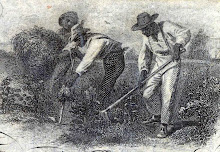
From the American Sociological Association Press Release, "Princeton Study Finds Foreclosure Crisis Had Significant Racial Dimensions: Residential segregation constitutes an important contributing cause of the current foreclosure crisis -- WASHINGTON, D.C., Oct. 4, 2010 — Although the rise in subprime lending and the ensuing wave of foreclosures was partly a result of market forces that have been well-documented, the foreclosure crisis was also a highly racialized process, according to a study by two Woodrow Wilson School scholars published in the October 2010 issue of the American Sociological Review.
Woodrow Wilson School Ph.D. candidate Jacob Rugh and Woodrow Wilson School’s Henry G. Bryant Professor of Sociology and Public Affairs, Douglas Massey, assessed segregation and the American foreclosure crisis. The authors argue that residential segregation created a unique niche of minority clients who were differentially marketed risky subprime loans that were in great demand for use in mortgage-backed securities that could be sold on secondary markets.
The authors use data from the 100 largest U.S. metropolitan areas to test their argument. Findings show that black segregation, and to a lesser extent Hispanic segregation, are powerful predictors of the number and rate of foreclosures in the United States – even after removing the effects of a variety of other market conditions such as average creditworthiness, the degree of zoning regulation, coverage under the Community Reinvestment Act, and the overall rate of subprime lending.
“This study is critical to our understanding of the foreclosure crisis since it shows the important and independent role that racial segregation played in the housing bust,” said Rugh.
A special statistical analysis provided strong evidence that the effect of black segregation on foreclosures is causal and not simply a correlation.
“While policy makers understand that the housing crisis affected minorities much more than others, they are quick to attribute this outcome to the personal failures of those losing their homes – poor credit and weaker economic position,” noted Massey. “In fact, something more profound was taking place; institutional racism played a big part in this crisis.”

The authors conclude that Hispanic and black racial segregation was a key contributing cause of the foreclosure crisis. “This outcome was not simply a result of neutral market forces but was structured on the basis of race and ethnicity through the social fact of residential segregation,” the authors note in the article.
“Ultimately, the racialization of America’s foreclosure crisis occurred because of a systematic failure to enforce basic civil rights laws in the United States,” the authors write in the article. “In addition to tighter regulation of lending, rating, and securitization practices, greater civil rights enforcement has an important role to play in cleaning up U.S. markets. It is in the nation’s interest for federal authorities to take stronger and more energetic steps to rid U.S. real estate and lending markets of discrimination, not simply to promote a more integrated and just society but to avoid future catastrophic financial losses.”

Jacob Rugh’s research focuses on urban policy and the intersection of housing markets, land use regulation, and local politics. His forthcoming dissertation will focus on the social, economic, and local regulatory roots of the recent U.S. housing crisis and their implications for public policy.
Douglas Massey’s research focuses on international migration, race and housing, discrimination, education, urban poverty, and Latin America. He is the author, most recently, of Brokered Boundaries: Creating Immigrant Identity in Anti-Immigrant Times (Russell Sage Foundation, 2010), coauthored with Magaly Sanchez. He has also authored Return of the L-Word: A Liberal Vision for the New Century (Princeton University Press, 2005) and Strangers in a Strange Land: Humans in an Urbanizing World (Norton, 2005). Massey currently serves as President of the American Academy of Political and Social Science and is past-President of the American Sociological Association and the Population Association of America. He is a member of the National Academy of Sciences, the American Academy of Arts and Sciences, and the American Philosophical Society. (source: American Sociological Association Press Release)
Editor's Note: The sound of this video is appalling! However, the sound quality should not reflect the quality of this lecture. I wish Professor Massey would do a voice-over or post more of his lectures. There seems to be an inverse relationship with respect to sound technology and the scholarship of the speaker. You can hear the most asinine crap with clarity, yet when it comes to actually LEARNING SOMETHING, the sound man is asleep at the switch. I think it's some kind of conspiracy theory to keep Americans dumb and dumber. The WORST recordings are found in academe. Is microphone technology that far out of the reach of most colleges and universities?


May I quote you a picture??
ReplyDeleteQUANTUM BINARY SIGNALS
ReplyDeleteGet professional trading signals delivered to your mobile phone daily.
Follow our signals right now and earn up to 270% daily.